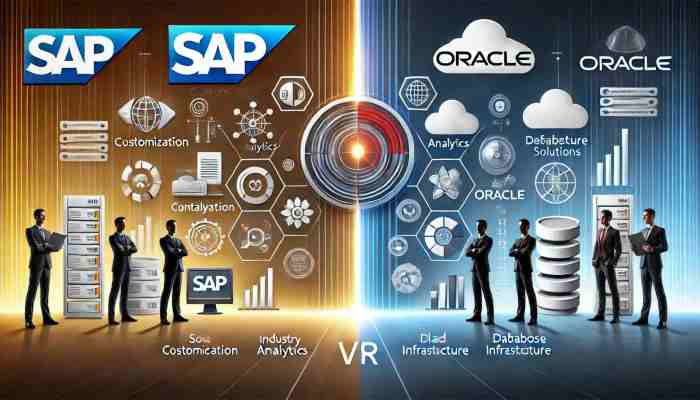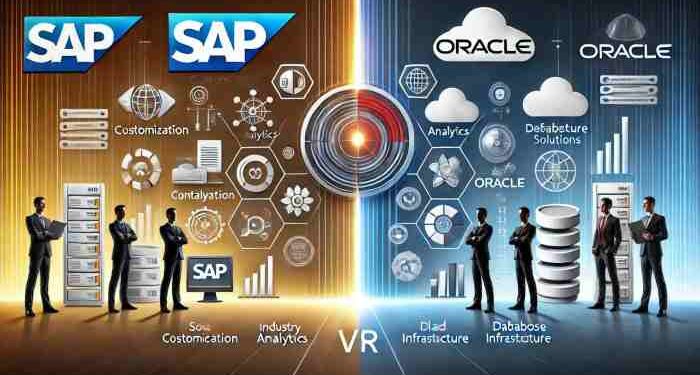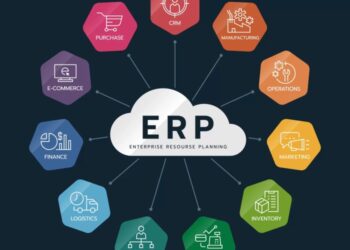Delve into the realms of Oracle and SAP, two giants in the world of technology. From their inception to their current standing, this narrative promises a captivating journey through their features, differences, and impact on various industries.
Introduction to Oracle and SAP
Oracle and SAP are two leading software companies that provide enterprise solutions to businesses around the world. Each company offers a range of products and services designed to streamline operations, improve efficiency, and drive growth.Oracle, founded in 1977, focuses on database management systems, cloud applications, and hardware products.
The company's core functionalities include database management, cloud services, and enterprise software solutions. Over the years, Oracle has expanded its offerings to include a wide range of products that cater to various industries and business needs.SAP, on the other hand, was founded in 1972 and is known for its enterprise resource planning (ERP) software.
SAP's core functionalities revolve around ERP solutions, business intelligence, analytics, and customer relationship management. The company has a strong presence in industries such as manufacturing, retail, and finance, offering tailored solutions to meet specific industry requirements.In terms of target markets and industries, Oracle and SAP serve different sectors.
Oracle has a broader focus, catering to a wide range of industries including retail, healthcare, and telecommunications. SAP, on the other hand, has a strong presence in manufacturing and logistics, with a focus on providing industry-specific solutions to optimize operations and improve efficiency.
Oracle Products and Services
Oracle Corporation offers a wide range of products and services to cater to various business needs, including databases, enterprise resource planning (ERP) systems, and cloud solutions.
Key Products Offered by Oracle
- Oracle Database: A leading relational database management system used for storing and retrieving data efficiently.
- Oracle ERP Cloud: A comprehensive suite of cloud-based applications for managing finance, HR, supply chain, and other business processes.
- Oracle Cloud Infrastructure: Provides a secure and scalable cloud computing platform for businesses to deploy and manage their applications.
Use Cases for Oracle Products
Oracle databases are commonly used in large enterprises and organizations where data security, scalability, and performance are crucial. ERP systems help streamline business operations by integrating various functions like finance, human resources, and supply chain management. Oracle cloud solutions offer flexibility and cost-effectiveness for businesses looking to modernize their IT infrastructure.
Integration Capabilities of Oracle Products
Oracle products are known for their strong integration capabilities with other systems and applications. The Oracle Integration Cloud enables seamless connectivity between different technologies, allowing businesses to leverage their existing investments while adopting new technologies. This integration capability helps organizations improve efficiency, reduce costs, and enhance collaboration across departments.
SAP Products and Services
SAP offers a wide range of products and services to help businesses streamline their operations and enhance productivity. From enterprise resource planning (ERP) solutions to customer relationship management (CRM) and human capital management (HCM) tools, SAP caters to various business needs across different industries.
Key Products Offered by SAP
- SAP S/4HANA: SAP's flagship ERP software that integrates various business functions into a single platform, enabling real-time data processing and analytics.
- SAP SuccessFactors: A cloud-based HCM suite that helps organizations manage their workforce efficiently, from recruiting to performance management.
- SAP Customer Experience (CX): CRM software that enables businesses to deliver personalized customer experiences and drive sales growth.
Functionalities of SAP’s ERP, CRM, and HCM Solutions
- SAP's ERP solution streamlines business processes, improves efficiency, and provides insights for better decision-making through integrated data analysis.
- The CRM software helps businesses manage customer relationships, track interactions, and personalize marketing strategies to enhance customer satisfaction and loyalty.
- SAP's HCM tools focus on managing employee data, recruitment, performance evaluation, and talent development to optimize workforce productivity and engagement.
Industry-Specific Solutions by SAP
- SAP offers industry-specific solutions tailored to meet the unique needs of sectors such as retail, manufacturing, healthcare, and finance, providing specialized features and functionalities.
- For example, SAP Retail helps retailers optimize inventory management, pricing strategies, and customer engagement, while SAP Healthcare offers tools for patient care coordination and medical data management.
Oracle vs. SAP: A Comparison
When it comes to enterprise software solutions, Oracle and SAP are two of the biggest players in the market. Let's take a closer look at how these two companies compare in terms of market share, global presence, product strengths and weaknesses, as well as customer satisfaction.
Market Share and Global Presence
Oracle and SAP are both global leaders in the enterprise software industry, with a significant market share worldwide. According to recent reports, Oracle holds a slightly larger market share compared to SAP, especially in the database management and cloud services sectors.
However, SAP has a strong presence in the enterprise resource planning (ERP) software market, making it a tough competitor for Oracle in that specific area.
Strengths and Weaknesses of Oracle and SAP Products
Oracle is known for its robust database management systems and cloud services, offering a wide range of solutions for businesses of all sizes. On the other hand, SAP is a powerhouse in the ERP software space, providing comprehensive solutions for finance, HR, supply chain management, and more.
While Oracle excels in database technology, SAP has an edge in integrated business processes and analytics.In terms of weaknesses, Oracle has faced criticism for its complex licensing policies and high costs, which can be a barrier for smaller businesses. SAP, on the other hand, has been criticized for its steep learning curve and the time it takes to implement its solutions.
Both companies continue to address these issues to improve customer experience and satisfaction.
Customer Satisfaction and User Feedback
Customer satisfaction is a crucial aspect of any software provider, and both Oracle and SAP have their fair share of loyal customers and critics. While Oracle users appreciate the performance and scalability of its database solutions, they often cite concerns about licensing costs and support services.
SAP users, on the other hand, value the integration capabilities of its ERP software but may find it challenging to navigate the complexity of the system.Overall, customer satisfaction levels vary depending on the specific needs and preferences of each business.
Both Oracle and SAP continue to invest in innovation and customer support to enhance user experience and address any concerns raised by their clients.
Implementation and Integration

When implementing Oracle or SAP systems, it is important to follow best practices to ensure a successful deployment. Challenges may arise during the integration process with existing IT infrastructure, but with the right strategies, these obstacles can be overcome
. Here are some tips for a smooth implementation and integration of Oracle or SAP solutions:Best Practices for Implementation
- Define clear objectives and scope for the implementation project.
- Engage key stakeholders from different departments to ensure alignment.
- Conduct thorough training sessions for users to maximize adoption.
- Regularly communicate progress updates to keep all stakeholders informed.
Challenges in Integration
- Compatibility issues with existing legacy systems.
- Data migration and cleansing can be complex and time-consuming.
- Resistance to change from employees accustomed to old processes.
- Lack of expertise in handling the new system among IT staff.
Tips for Successful Deployment
- Start with a pilot phase to identify and address any issues early on.
- Customize the system to meet the specific needs of your organization.
- Regularly monitor and evaluate the system performance post-implementation.
- Seek feedback from users to make continuous improvements.
Training and Certification
Training programs for Oracle and SAP products are essential for individuals looking to enhance their skills and knowledge in these technologies. These programs offer a structured approach to learning the intricacies of Oracle and SAP systems, equipping participants with the necessary expertise to handle complex business processes efficiently.
Oracle Training and Certification
Oracle offers a range of training courses covering various products and services, including Oracle Database, Oracle Cloud, and Oracle Applications. These programs cater to different skill levels, from beginners to advanced users, and are designed to provide in-depth knowledge of Oracle technologies.
Obtaining Oracle certifications validates an individual's proficiency in using Oracle systems, enhancing their credibility and career prospects in the tech industry.
SAP Training and Certification
Similarly, SAP provides training programs for its suite of products, such as SAP S/4HANA, SAP HANA, and SAP Business One. These courses are tailored to different roles within an organization, including developers, administrators, and consultants, and focus on developing practical skills in SAP software.
By pursuing SAP certifications, professionals can demonstrate their expertise in implementing and managing SAP solutions, opening up opportunities for career advancement and higher earning potential.
Benefits of Obtaining Oracle or SAP Certifications
- Validates expertise in Oracle or SAP technologies, enhancing credibility in the industry.
- Increases job opportunities and prospects for career advancement.
- Demonstrates commitment to continuous learning and professional development.
- Provides access to a network of certified professionals for knowledge sharing and collaboration.
- Can lead to higher salaries and better job security in the competitive tech market.
Importance of Continuous Learning and Upskilling
Continuous learning and upskilling in Oracle and SAP technologies are crucial for staying relevant in the rapidly evolving tech landscape. By keeping pace with the latest advancements in Oracle and SAP systems, professionals can adapt to changing business requirements and drive innovation within their organizations.
Moreover, ongoing training and certification help individuals remain competitive in the job market and secure lucrative opportunities in the tech industry.
Future Trends and Innovations
As technology continues to evolve at a rapid pace, it is essential for companies like Oracle and SAP to stay ahead of the curve by embracing emerging trends and innovations. In this section, we will explore how these tech giants are adapting to new technologies such as AI, IoT, and blockchain, and predict the future direction of Oracle and SAP in the context of digital transformation.
AI Integration
Artificial Intelligence (AI) is revolutionizing the way businesses operate, and both Oracle and SAP are integrating AI capabilities into their products and services. AI-powered analytics, automation, and predictive modeling are being used to enhance decision-making processes and improve efficiency across various business functions.
IoT Implementation
The Internet of Things (IoT) is another game-changer in the tech industry, and Oracle and SAP are leveraging IoT technologies to enable real-time data collection and analysis. By connecting devices and sensors to their platforms, these companies are helping businesses optimize operations, improve customer experiences, and drive innovation.
Blockchain Adoption
Blockchain technology is gaining traction in various industries for its secure and transparent nature. Oracle and SAP are exploring blockchain solutions to enhance data security, streamline transactions, and create trust among stakeholders. By incorporating blockchain into their offerings, these companies are paving the way for more secure and efficient business processes.
Future Outlook
Looking ahead, Oracle and SAP are expected to continue innovating and adapting to the evolving technological landscape. With a focus on cloud computing, AI, IoT, and blockchain, these companies are well-positioned to lead the way in digital transformation and drive value for their customers.
By staying agile and proactive in embracing new trends, Oracle and SAP are poised for continued success in the future.
Final Summary
As we conclude our exploration of Oracle and SAP, it is evident that these tech powerhouses continue to shape the digital landscape. Their evolution, strengths, and adaptability pave the way for a future where innovation knows no bounds.
Answers to Common Questions
How do Oracle and SAP differ in target markets?
Oracle often targets larger enterprises while SAP caters to businesses of all sizes.
What are the key products offered by SAP?
SAP offers ERP, CRM, and HCM solutions among its key products.
Can Oracle databases be easily integrated with other systems?
Yes, Oracle databases have strong integration capabilities with various systems.








![Best Construction ERP Software [2024 Edition]](https://health.bandungnews.id/wp-content/uploads/2025/10/Top-10-Best-Construction-ERP-Software-to-Use-in-2024-1-120x86.jpg)



